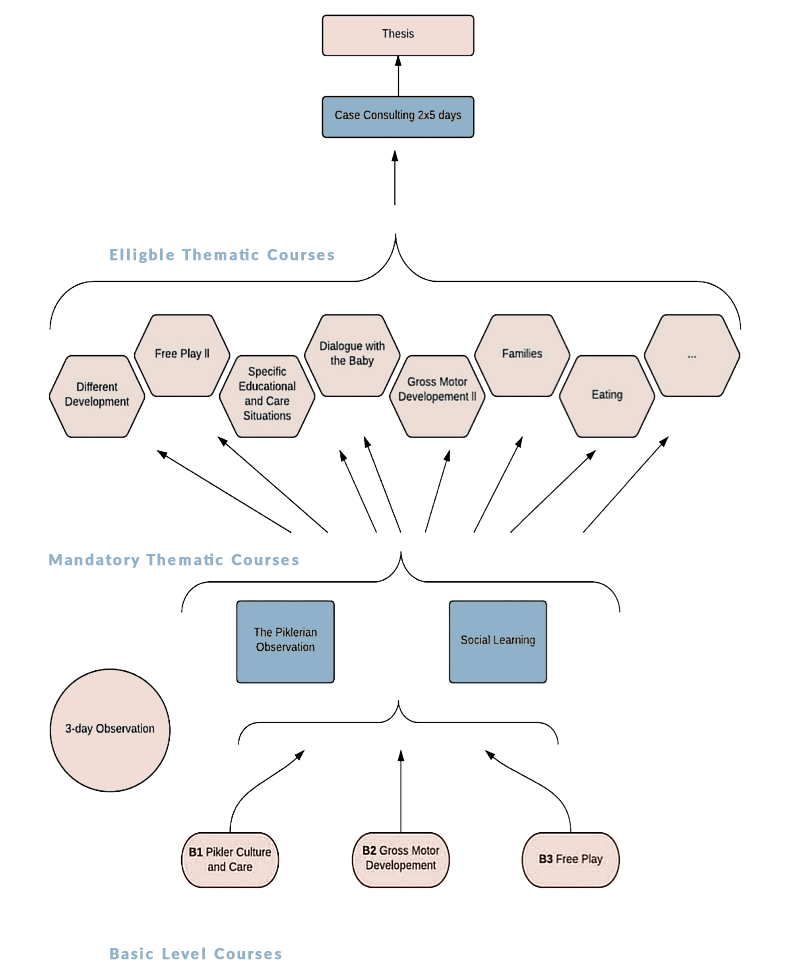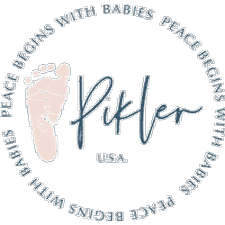
From the Pedagogy at Pikler.org

BASIC LEVEL COURSE
Understanding & Deepening your Knowledge of the Pikler® Approach
This 10 day course is designed for those would like to get to know and be informed by the Pikler® Institute itself, where Emmi Pikler® worked. Participants will deepen their knowledge about early childhood education through studying our most important pedagogical principles, learning about everyday experiences with children, and also through hearing about the results of research carried out by the Pikler® Institute.
During the course we will discuss the importance of self-initiated movement and development of play, including the many stages of this development – often overlooked. We shall talk about the importance of careful and attentive physical care and also some less well known aspects of Pikler® pedagogy, such as the child’s developing social behaviour, and the characteristics of respectful communications.
We shall also discuss the special features of the parent-child relationship and the relationship between the child and the professional carer, educator or nurse.
The topics will be elaborated by presenting core materials of the Institute. The results of research and practical experience, the opportunity to watch and analyze photos and video footage, accounts of personal practice and discussion of the questions raised by participants will all be included. The course will be held by the “Pikler® team”, including former colleagues of Emmi Pikler® and other experienced professionals of the Institute.
Typewritten applications should be submitted including a short summary of the applicant’s professional activity, interest and experience of the Pikler® ideas.
ADVANCED LEVEL THEMATIC COURSES
Observation
Accurate observation informs the adult’s decisions on how to structure the environment to
best facilitate the next stages of developmental unfolding for each child.
During this seminar you will learn about the methodology for observation,
and you willpractice and grow your own skills.
The video footages offered for analysis and discussion were recorded at the
Pikler® Institute, the Pikler® Emmi Day Care, and in family settings.
Course outline:
• The importance of observation in early development
• The caregiver’s developing observation skills
• Observing the child’s autonomous activity: What to look for in children’s play
• Observation in the Parent-Child group: How we communicate our observations with the parent
Nonviolent early care and education based on the Pikler® Approach
In this workshop you will learn, through video analysis and discussion, the components
that make up respectful and tactful adult behavior toward infants and toddlers.
You will learn how to accompany and orient a child without power struggles, without force,
and without resorting to involuntary violence. You will learn how to raise a person who lives
“in peace with him/herself and with others”.
The video footages offered for analysis and discussion were recorded at the
Pikler® Institute, the Pikler® Emmi Day Care, and in family settings.
Course outline:
• From independent development of movement to education without violence
• Solving conflicts without using coercion
• The paediatrician’s everyday activity with the child and the respectful medical care
Problems around meal time: How to avoid force-feeding practices
These two courses are for professionals who have already participated in the two-weeklong
1st level Summer-course at our Institute in Budapest, Hungary between 2004 and 2016 and who are involved in working with children, are parents or educators. The participants will already have experience
with what the Piklerian approach of caring for young children can mean in the various fields, i.e. foster homes, residential nurseries, day-care centers (crèche), parent-child groups, or other settings. This course will provide a possibility to deepen their knowledge and will include new topics that will also be discussed:
prevention and handling of conflict situations, caring children who cause difficulties due to
different reasons, and methods of supporting parents and educators. It will also give participants an opportunity to discuss problems that they may face in family or group settings.
For discussion, the participants of the advanced level trainings should bring either a video recording or a written description of their own observation in a pedagogic situation.This may also be a description
of a specific child or situation.
When applying, we ask you to please write a letter describing what experience, success and/or difficulties you have in your everyday work and what topics you would like to get more information on to help you deepen your knowledge.
Training including observation of children’s groups
There are opportunities for observations in our day-care center (crèche) and parent-child groups. Before each observation, the participant is given introductory information about the present situation of the children’s groups, the day-care center and/or the parent-child groups. After observing, participants are invited to discuss their experiences. The visits are possible first of all to those enrolled in our seminars (maximum of 2-3 persons at a time). Observation is not possible on weekends, only on workdays.
In case of a group visit (for students, teachers and educators)
During the first half of the day, we introduce our work to the group with the help of video-illustration and we answer participant’s questions. During this visit there will not be an opportunity to see the children’s groups, only the physical environments. Please note that we can only accept limited sized groups.
INTENSIVE PIKLER® PROFESSIONAL TRAINING
Exclusive Pikler® Professional Training summer course to be implemented in the 2019-2020 school year. Join Pikler® Pedagogues in July & August, Miami 2019.
Participants will deepen their knowledge about early childhood education through studying our most important pedagogical principles, learning about everyday experiences with children, and through hearing about the results of research carried out by the Pikler® Institute. During the course we will discuss the importance of self-initiated movement and development of play, including the many stages of this development – often overlooked. We shall talk about the importance of careful and attentive physical care and also some less well known aspects of Pikler® pedagogy, such as the child’s developing social behaviour, and the characteristics of respectful communications.
We shall also discuss the special features of the parent-child relationship and the relationship between the child and the professional carer, educator or nurse.
The topics will be elaborated by presenting core materials of the Institute. The results of research and practical experience, the opportunity to watch and analyze photos and video footage, accounts of personal practice and discussion of the questions raised by participants will all be included. The course will be held by the “Pikler® Team”, including former colleagues of Emmi Pikler® and other experienced professionals of the Institute. Typewritten applications should be submitted including a short summary of the applicant’s professional activity, interest and experience of the Pikler® ideas.
The observation method used at the Pikler® Institute is an important element of the Pikler® approach. Observation is the key to understanding infant and toddler needs and behavior. Observation allows us to follow and monitor individual children’s developmental progress with accuracy. Accurate observation informs the adult’s decisions on how to structure the environment to best facilitate the next stages of developmental unfolding for each child.
During this course you will learn about the methodology for observation, and you will practice and grow your own skills. The video footages offered for analysis and discussion were recorded at the Pikler® Institute, the Pikler® Emmi Day Care, and in family settings.
Course Outline:
The importance of observation in early development
The caregiver’s developing observation skills
Observing the child’s autonomous activity: What to look for in children’s play
Observation in the Parent-Child group: How we communicate our observations with the parents
For more information go to pikler.org
